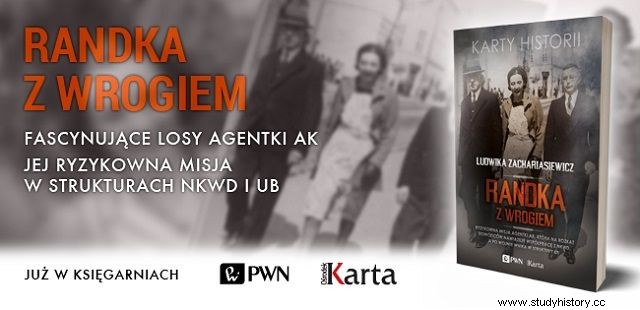Not only the communist secret police tried to surveillance members of the independence underground. The Home Army soldiers also did their best to install their plugs in the structures of the Security Offices. Are they rightly accused of treason today?
Infiltrating the ranks of enemies in order to obtain information or carry out subversive activities is a standard in the game of all world intelligence services - including the Home Army intelligence and counterintelligence, whose cells existed in all territorial units of the organization.
Their operation under the conditions of occupation and underground was doubly difficult, but the mechanism itself did not differ from that used in the non-conspiratorial armies. By money, blackmail or in any other way, it was necessary to persuade an officer of the opposing party to pass on the information or, if possible, to try to place one's own man on the hostile side, who was usually a more reliable source. How it worked in Warsaw was mentioned, among others, by Home Army and Insurgent Juliusz Kulesza "Julek":
Young people, unfamiliar with the realities of the time, do not always realize that the fight against the Nazis in occupied Warsaw did not have a clear front line. Here, the two warring sides formed a tangled tangle, locked in a death grip. The occupant did everything to decipher the Polish conspiracy by infusing the most cunning provocateurs into its structures.
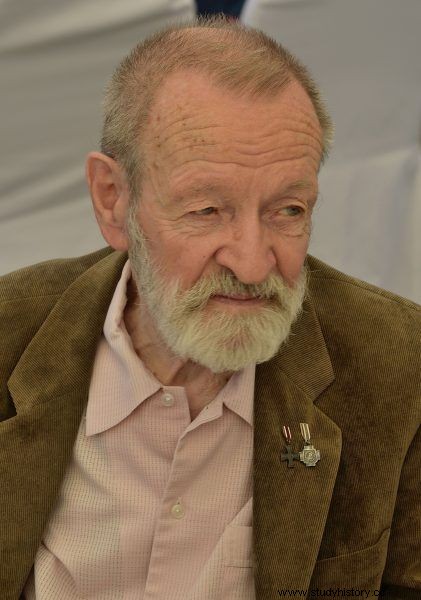
Juliusz Kulesza in 2015.
The operation of the AK counterintelligence was mirrored in this respect; there were attempts to have their own people in the blue police (which was easier), but also in the Kripo and the Gestapo. It was inevitable and even necessary for both sides to contact, a mutual game of appearances. The one who cheated the opponent won by winning his trust.
The problem was that the people cooperating with the occupant were, as a rule, sooner or later liquidated by the Home Army, and the fact that someone was in fact an underground agent was known - this is the nature of the conspiracy - by very few, sometimes only the officer leading it. So tragic mistakes were inevitable.
We do not know about all of them, we are not always sure what was and what was not a mistake. Kulesza himself cites the example of two Volksdeutsche (they were minors and the decision to sign the Volkslist was made by their parents) - sacrificial soldiers of the capital Kedyw, who were shot by the Home Army on August 1, 1944, when they went to join the uprising. Behind the survivors was the opinion of traitors and collaborators in the post-war era.
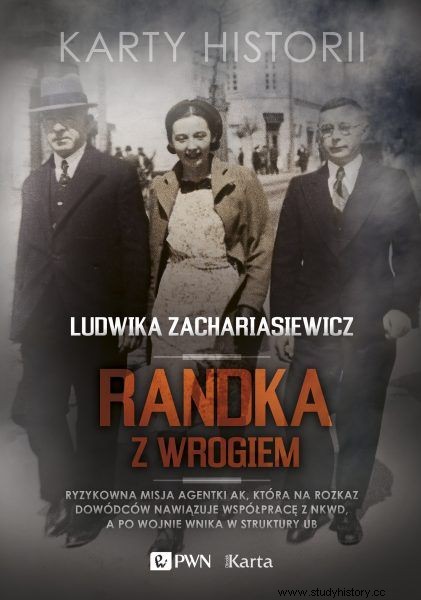
As there is no (and cannot be) any list of agents, it is impossible to establish how deeply the Polish underground penetrated the German services. Those who undertook this form of combat chose to remain anonymous, took the risk of death both at the hands of their enemies and their own, and had to take into account the controversy that would accompany them.
Militiaman from the woods
The disappearance of the Germans from Polish territory changed little in this matter - the communist services tried to crack down on the post-Home Army underground, while the post-Home Army soldiers tried to locate their people in the structures of the NKVD, Security Offices or the Citizens' Militia.
Interestingly, the conspirators initially won this war for information. Communists had a poor knowledge of what was going on in the underground, as evidenced by, for example, the massive, chaotic arrests of men of just the right age. The security office also believed, according to operational data, that many partisan units that had long been disbanded were still operational. And in surprisingly large numbers. In the Warsaw voivodship, out of the thirty branches mentioned in the documents, only fifteen functioned. In Lublin, the proportions were identical - sixty were investigated, in fact there were thirty.
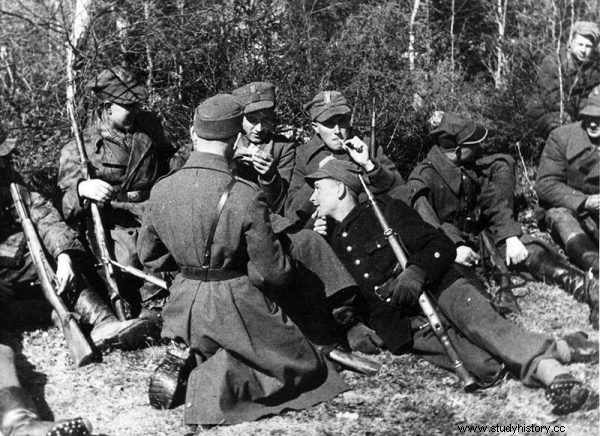
Initially, the underground was better versed in the plans of the security services than the services in the plans of the partisans.
The Home Army, on the other hand, was very successful, but rather on a local scale. What was most easily mastered was mastered quite quickly - the ranks of the Militia, which in some districts, for example in the vicinity of Rybnik and Lubaczów, were recruited almost exclusively from Home Army soldiers.
The conspirators were not always able to penetrate so deeply, but various forms of cooperation between militiamen and the underground are so often attested that it is difficult to speak of a coincidence here. The last Government Delegate for the country, Stefan Korboński, reported to London, for example, about a "unit" of the Militia, which went with the NKVD patrol for a pacification operation, shot the NKVD on the spot and "went to the forest". Professor Tomasz Strzębosz, in turn, wrote that in Pomerania, the Militia consisted of "entire Home Army units to defend the population against Soviet deserters."
Dąmbski's memories are to some extent confirmed by the security report of March 19, 1945, stating that the militiamen, together with the Home Army soldiers, slaughtered Ukrainians in Pawłokom. In the same area, it happened that a Home Army unit stopped an NSZ unit from liquidating a friendly Militia post and the case ended in a common drunkenness.
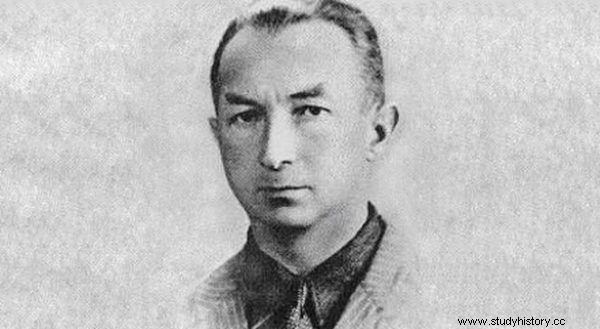
The last Delegate of the London Government to Poland, Stefan Korboński.
It is difficult to bargain in numbers here, but the infiltration of the Militia by the Home Army was very effective in the first post-war years, which somehow explains the quite long period of the underground activity. A characteristic testimony was given by a certain Elżbieta Rojek, who was questioned by the UB in Rybnik. When asked if she recognized a certain policeman, she said:"I do not know this policeman either during Poland or during the occupation, because all this militia was hidden in the forest as partisans."
Such lame security
And what was it like in the case of other services of the communist regime? We have much less knowledge here, although several cases of infiltration into the structures of the NKVD and Bezpieka confirm that at least some attempts were made to do so. This is mentioned, among others, by Ludwika Zachariasiewicz in the book "Dating with the enemy":
After the front had passed, I was supposed to report to the NKVD in Wołomin as a patriot who considers it my duty to cooperate with the allied army. In preparing me, "Adam", conducted a sort of interrogation to see what and how I was going to say. I was supposed to reveal that I am from the Home Army, I know many people, I was active in a distribution point until the last moment. I was supposed to establish a point on Krasiński Square, which, of course, will not be there anymore. I was supposed to say everything about myself, because if I legalize myself, I can't get lost.
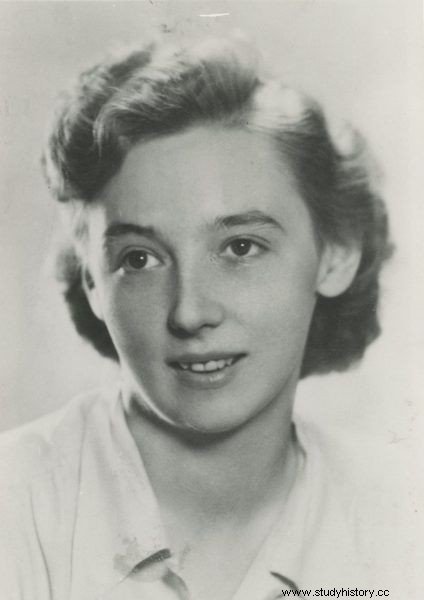
Ludwika Zachariasiewicz in a photo from 1943 from the family collection (the photo comes from the book "Dating with an Enemy", recently published by PWN Scientific Publishers and Ośrodek Karta).
Zachariasiewicz was an agent in the NKVD for several months, then she was "installed" in the Militia in Grudziądz, from where she managed to penetrate the ranks of the local secret police. "There, I acted more effectively for the underground - in my opinion - than in the NKVD, because there was nothing I didn't know about:I was telling you who is shedding, what are the arrests, where and when there will be a search, who is sitting, who they are chasing, when the action is to take place. . And these actions often failed. They came back so angry, they swore, and I laughed, mocked them that they were bad, that's why they were so furious afterwards "- recalls Mrs. Ludwika.
She wasn't the only one. The head of the poviat post in Nowy Targ was for some time Józef Kuraś "Ogień" - although in the case of this particular partisan there are too many question marks to be sure of his intentions. However, we know a few cases from the vicinity of Rybnik, when the "plug" in the local security service was installed very effectively.
The story of Paweł Sosna is best documented. He was issued with false documents of an NKVD associate, on the basis of which, in April 1945, he was admitted to work in the Security Office. Sent to Katowice for training, he completed it and returned to Rybnik as an investigator. At the turn of 1945 and 1946, we find him as a senior investigating officer in Racibórz.

More memories of Ludwika Zachariasiewicz can be found in the book entitled "Dating with the enemy" (PWN Scientific Publisher, Ośrodek Karta 2017).
Historian Andrzej Dziuba, on the basis of research in the Katowice branch of the Institute of National Remembrance, established that probably other members of the UB were probably cooperating with the Home Army:Karol Krzyżak and Władysław Smolarski. A partisan with the pseudonym "Kazek" (NN) was probably also placed in the Cieszyn security service.
In this context, the recently publicized issue of cooperation with the Bezpieka by General Zbigniew Scibor-Rylski, the company commander of the "Czata 49" Battalion in the Warsaw Uprising, becomes much clearer. The general did not hide this fact, because he probably just had nothing to hide ...
After the Uprising, when I was saying goodbye to "Radosław", he told me that it would be good to have someone to inform who the "hook" is on UB - Scibor-Rylski said in an interview with the TwójHistoria.pl portal.
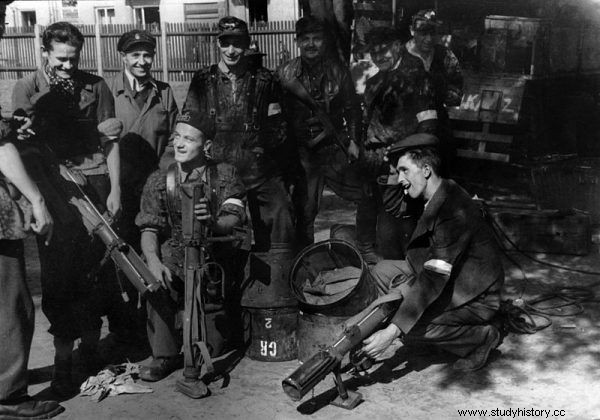
Soldiers of the Czata 49 Battalion, commanded by Gen. Scibor-Rylski.
The general took his superior's suggestion to heart and led to a situation in which he was offered cooperation. From his point of view, it was the only sane method of continuing the fight:
He (the secretary's recruiting agent - aut.) told him to let him know who is against this regime. As soon as he asked about someone in particular, I immediately warned them. He inquired about four women and three or four men. He gave me their details, including their addresses, so that I could tell you what I thought about them. I told these people that the UB was interested in them. That they should change flats or even leave Poznań.
Zachariasiewicz exposed herself and served her in Stalinist prisons, Scibor-Rylski managed to avoid it. They are one of the few who live to this day and are able to tell what this form of combat looked like.
It will never be possible to establish as close as possible how many were like them:a few, a dozen, or maybe several thousand. We know very little about the numbers concerning the Home Army - which, by the way, is a good testimony to the quality of this conspiracy.
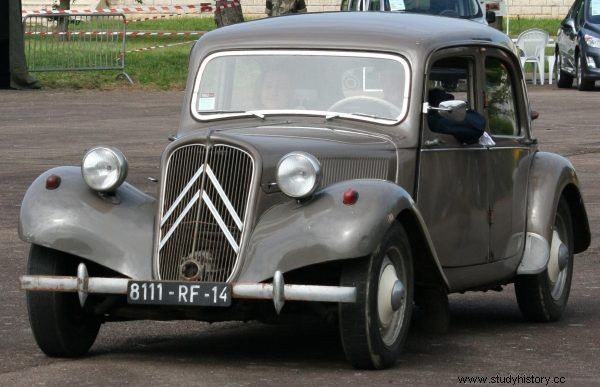
Citroën Traction Avant - a car often used in the Ministry of Public Safety. Could any of the Home Army soldiers take his wheel?
For example, historians write that 35-45 thousand Home Army members took advantage of the amnesty of August 2, 1945. There is no certainty about the 10,000 soldiers who officially made themselves known! What to speak of those who decided to go even deeper, especially since the people who could rehabilitate them were arrested - and maybe even killed?
One, though not the best clue, may be that in 1945 90 percent of the Bezpieka employees declared themselves believers - so one can theoretically assume that they were not indoctrinated communists, but rather random people, among whom there were probably also members of the Home Army. It was still possible to penetrate these institutions during this period.
Two years later the situation was reversed:90 percent declared atheism. The security services were strengthened and more concerned with the training and ideality of their employees, and purges within their own ranks were also beginning. All this tells us little about the number of potential Home Army agents in the ranks of the UB, but at least it convinces us that at the end of the war, such actions were not ruled out and the agents were indeed installed.
Perhaps some of them had betrayed, some were liquidated by soldiers cursed during the action on the Security Offices ... It must be remembered that it was a war without a clearly delineated front, a "tangled tangle" - as Kulesza put it.
The presumption of innocence is good old legal principle. In the absence of hard evidence, it is worth remembering.
Buy the book cheaper on the publisher's website:
